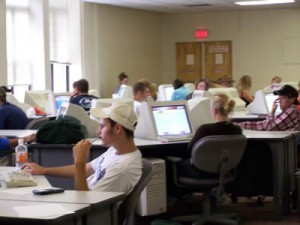Educators should change the way they view technology’s role in everyday life in order to understand students’ educational needs, said Don Tapscott, chairman of nGenera Insight, during a Jan. 19 Consortium for School Networking [1] webinar on the digital generation.
The nation is at a turning point, Tapscott said, and many institutions that have served us well for decades or even centuries—including education—have come to the end of their life cycle and must be “rebooted” or reinvented for a new age.
“This is an age where human communication is possible on a global basis,” he said.
Tapscott’s newest book, Grown Up Digital [2], looks at the so-called digital natives, some of whom are now college graduates, and how this generation is shaping education and the workforce. In 1998 he wrote Growing Up Digital, which examined this same group of students when they were K-12 students.
These digital natives are truly shaping the way technology is used and the things it is used for, he noted.
In 1998, “I noticed these kids were using the web differently than adults were—they were mainly using it for discussion or communication,” Tapscott said. “This is the true meaning of the internet—it’s not about presenting content or managing knowledge, it’s a new platform for communication and collaboration, for building communities.”
He added: “This is the Net Generation—computers, the internet, and technology shape it.”
The Baby Boomer generation tends to liken students’ continual internet use to excessive television watching, but the two are not necessarily the same thing, Tapscott said. The internet is not preventing kids from talking to their parents, doing their homework, or participating in extracurricular activities. If anything, he said, it takes away from TV time.
“Others think the digital age makes people stupid, that this generation is glued to the screen, is losing social skills, and is addicted to video games and the internet,” Tapscott said.
But in reality, today’s digital natives have made technology a natural and necessary part of their daily communication efforts, he said.
“This is the first time in history when children are an authority on something important. This digital revolution is changing every institution,” Tapscott said. And this, he added, has caused a generation “lap” instead of a generation gap, because kids are lapping parents on the digital track.
“This generation has a big problem—it’s us. The problem, to me, is older people who don’t ‘get it,'” Tapscott said.
“If someone was frozen 100 years ago and woke up today, they’d look around and they’d say the world has changed, and technology has been at the heart of these changes,” Tapscott said. “If they walked into many typical classrooms, they’d breathe a sigh of relief and say, ‘I recognize this.'”
The emphasis in today’s schools should be “not so much [on] what you know when you graduate, because we need learning to be lifelong,” Tapscott said. “We need to have a generation coming into the workforce that not only has knowledge, but can think, solve problems, communicate, and collaborate.”
Tapscott said educators should not “throw technology into a classroom and hope for good things.” By cutting back on lectures and using technology to engage students in tasks such as real-world problem solving, he said, educators will empower students to collaborate and focus on lifelong learning, not just teaching to a test.
Links:
Consortium for School Networking [1]
Grown Up Digital [2]
